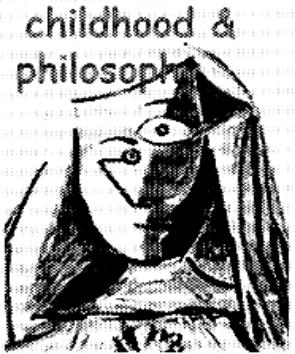re-claiming childhood: embracing alternative time dimensions through philosophy for children
DOI:
https://doi.org/10.12957/childphilo.2025.88213Keywords:
qualitative time dimensions, liminality, jazz, contemporary education, critical pedagogyAbstract
This proposal was born from an experience in a high school and highlights the generative influences of Philosophy for Children (P4C) on young adults. I first discuss and provide examples of how the school system traditionally does not value learning and thinking philosophically by flattening the process to the pre-packaged dispensation of ready-made answers. Such ways of learning, also known as the “banking” model of education, devalues children’s ways of knowing and being in the world. This pedagogical stance, among other problems, results in a focus on the quantitative-chronological dimension of time, leaving little to no room for the importance of the present moment that belongs to and is natural to most childhood experiences. The central part of the paper is an attempt to better explain, through concepts derived from anthropology and pedagogy, what this alternative time dimension consists of and what possibilities it unlocks within educational environments. In the final section, I argue that joining a community of inquiry like Philosophy for Children as a young adult poses greater complexity as breaking away from ingrained certainties becomes more intricate. Still, it also involves the opportunity to enter a metaphorical time machine that brings one back to reclaim the time of childhood. This metaphorical time machine opens possibilities for students and teachers to reorient their relationship with themselves, each other, and the world.
Downloads
References
Barreneche, M.M., & Santi, M. (2022). Philosophy for Children: the practice of (dis)orientation in community of inquiry. Studium Educationis, 23(2), 160–170. https://doi.org/10.7346/SE-022022-16
Barreneche, M.M., Santi, M., & Zorzi, E. (2023). Il dis-orientamento come navigazione nell’incertezza. Una ricerca con adolescenti in comunità di indagine filosofica. Edaforum, 20(43), 145–159. https://doi.org/10.19241/lll.v20i43.784
Birch, R. (2020). Discerning hope: Intra-actions of a philosophy for children workshop and the eco-socially just potential of practicing hope. Journal of Philosophy of Education, 54(4), 975–987. https://doi.org/10.1111/1467-9752.12484
Bolhuis, S. (2003). Towards process-oriented teaching for self-directed lifelong learning: A multidimensional perspective. Learning and Instruction, 13(3), 327–347. https://doi.org/10.1016/S0959-4752(02)00008-7
Contage, D. (2019). Infância e invisibilidade: por uma pedagogia do oculto. Childhood & Philosophy, 15, 1–15. 10.12957/childphilo.2019.42877
Cosentino, A., & Lupia, M.R. (2021). Didattica della comunità di ricerca. Per un’educazione democratica. Anicia.
Freire, P. (1971). La pedagogia degli oppressi. Mondadori.
Gadamer, H. G. (1989). Truth and method (J. Weinsheimer & D. G. Marshall, Eds. & Trans.; 2nd ed.). Crossroad.
Gennep, A. van (1960) [1909]. The Rites of Passage. Chicago University Press.
Gould, S.J., & Vrba, E.S. (1982). Exaptation. A missing term in the science of form. Paleobiology, 8(1), 4–15.
Haiven, M., & Khasnabish A. (2014). The Radical Imagination: Social Movement Research in the Age of Austerity. Zed Books.
hooks, b. (1994). Teaching to Transgress: Education as the Practice of Freedom. Routledge.
hooks, b. (2003). Teaching Community. A Pedagogy of Hope. Routledge.
hooks, b. (2010). Teaching Critical Thinking. Practical Wisdom. Routledge.
Kennedy, D., & Kohan, W.O. (2016). Childhood, Education and Philosophy. A matter of time. In M.R. Gregory, J. Haynes, & K. Murris (Eds.), The Routledge International Handbook of Philosophy for Children. Routledge. https://doi.org/10.4324/9781315726625
Kohan, W.O. (2014). Philosophy and Childhood. Critical Perspectives and Affirmative Practices. Palgrave McMillan.
Lipman, M. (1980). Philosophy in the Classroom. Temple University Press.
Manguel, A. (2016). Curiosity.Yale University Press.
Masschelein, J. (2010). E-ducating the gaze: the idea of a poor pedagogy. Ethics and Education, 5(1), 43–53.
Oliveros, P. (2005). Deep listening - A composer’s sound practice. iUniverse, Inc.
Santi, M. (Ed.) (2005). Philosophy for Children: un curriculo per imparare a pensare. Liguori Editore.
Santi, M. (2015). Improvvisare creatività: nove principi di didattica sull’eco di un discorso polifonico. Studium Educationis, 2, 103–113.
Santi, M., & Zorzi, E. (Eds.). (2016). Education as Jazz: Interdisciplinary Sketches on A New Metaphor. Cambridge Scholars.
Santi, M. (2017). Jazzing Philosophy for Children. An improvising way for a new pedagogy. Childhood & Philosophy, 15, 1–19.
Santi, M. (2020, March 15). “Perdersi per ritrovarsi”: in ricordo di Ezio Bosso. Il Bo Live, il giornale dell’Università di Padova. https://ilbolive.unipd.it/it/news/perdersi-ritrovarsi-ricordo-ezio-bosso.
Thomassen, B. (2009). The Uses and Meaning of Liminality. International Political Anthropology, 2(1), 5-28.
Turner, V. (1967). Betwixt and Between: The Liminal Period in Rites de Passage. In V. Turner, The Forest of Symbols. Cornell University Press.
Zorzi, E., Camedda, D., & Santi, M. (2019). Tra improvvisazione e inclusione: il profilo “polifonico” delle professionalità educative. Italian Journal of Special Education and Inclusion, 7(1), 91–100.



